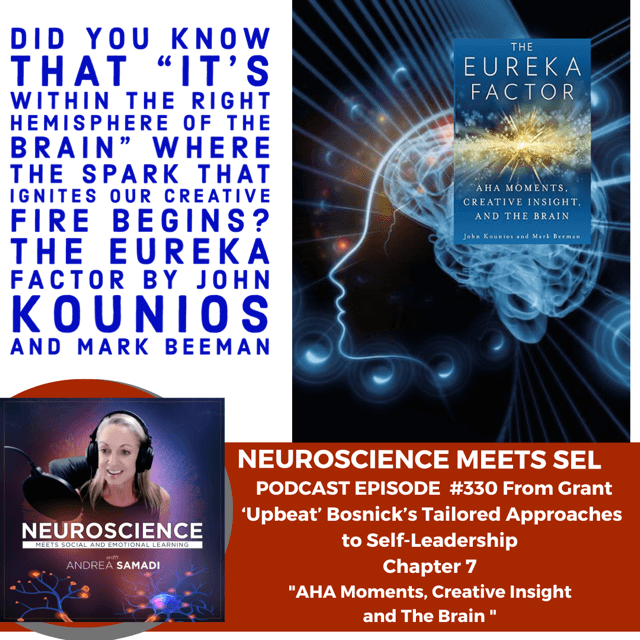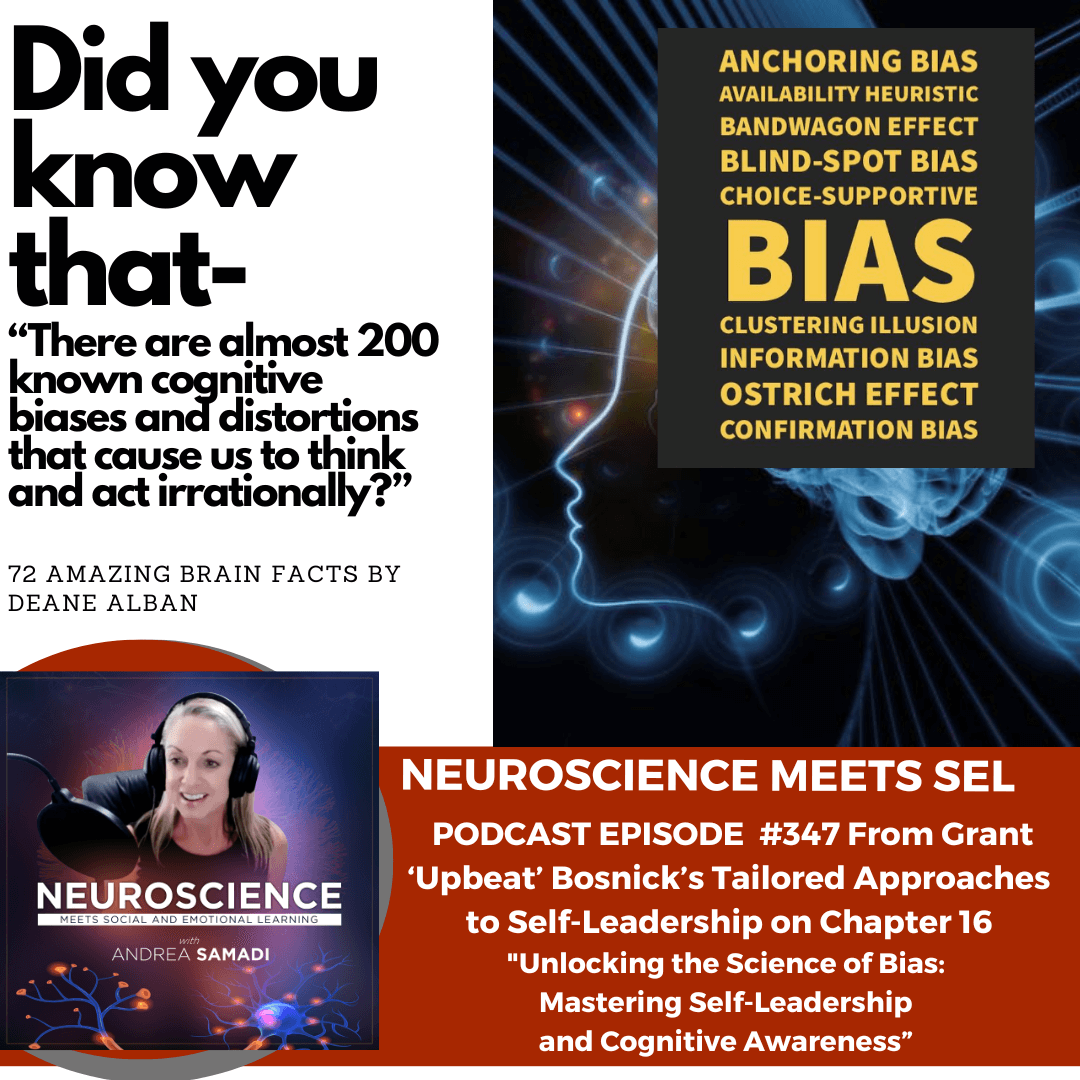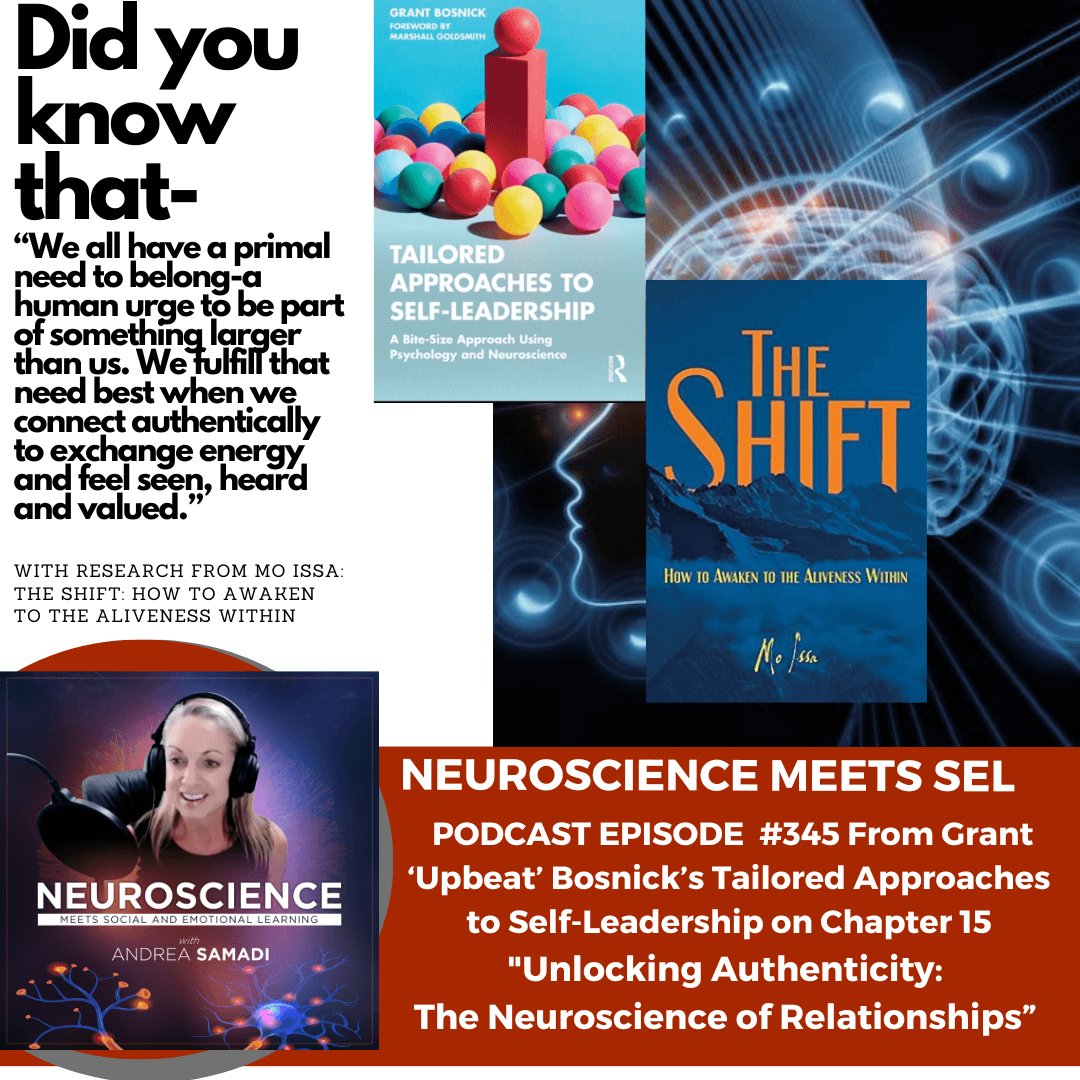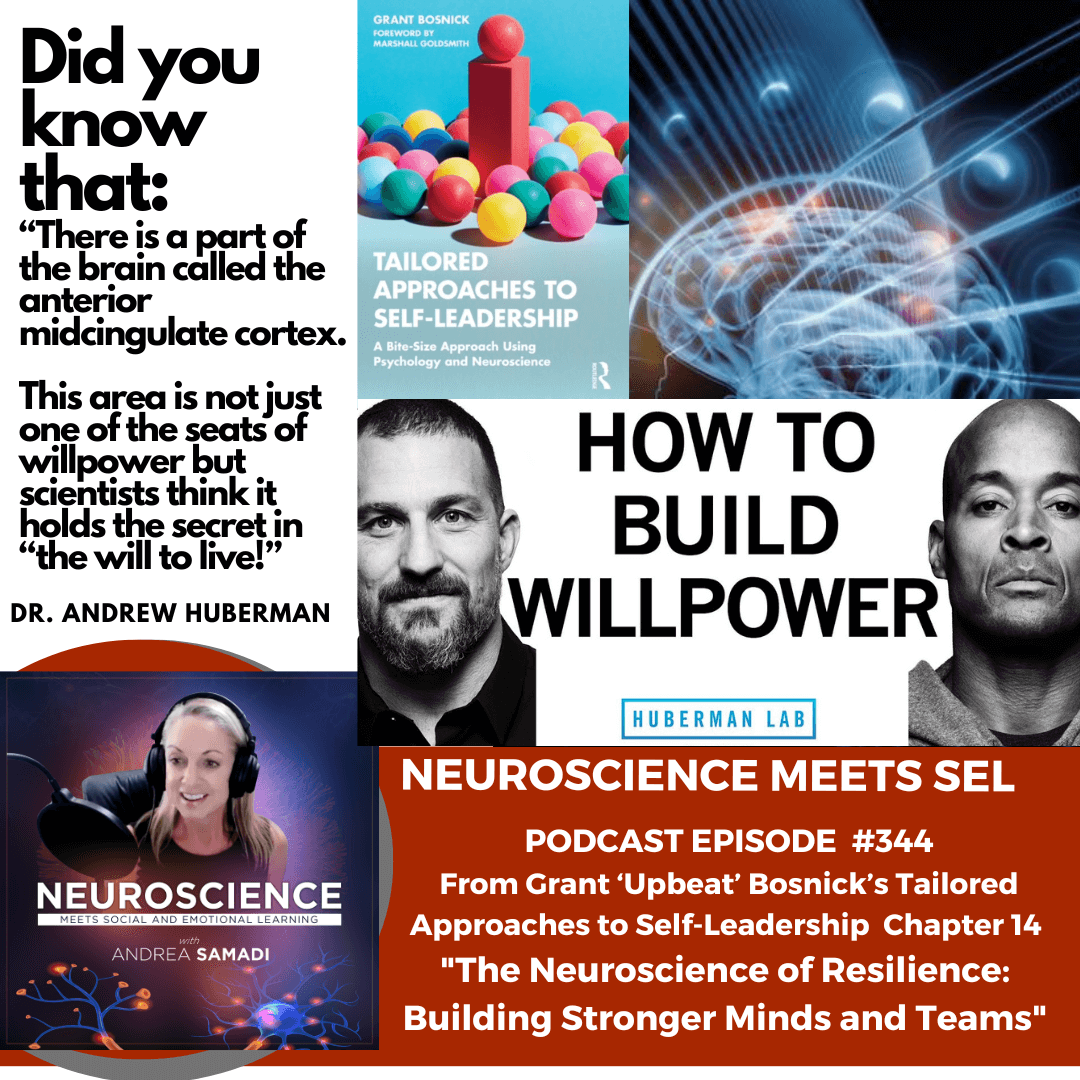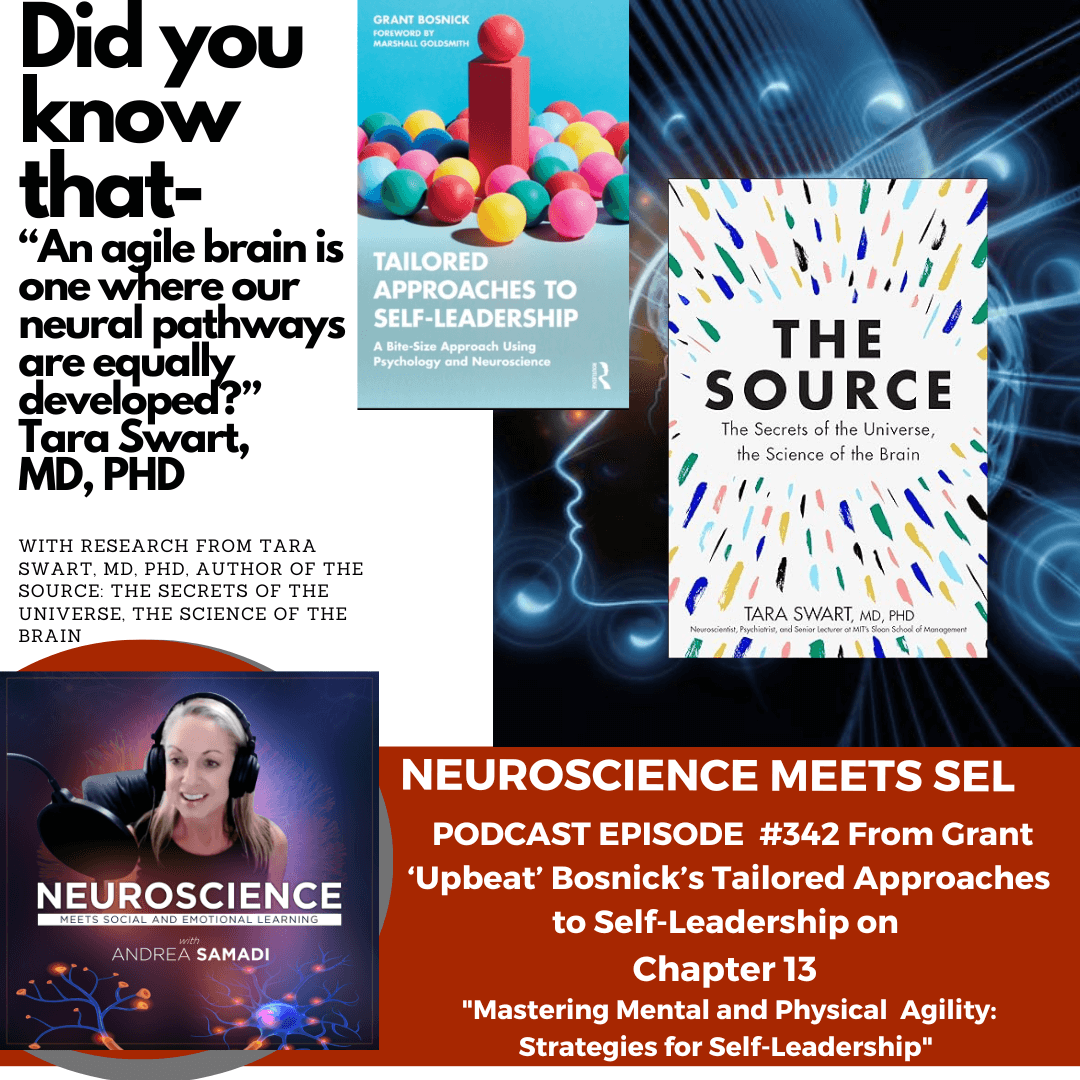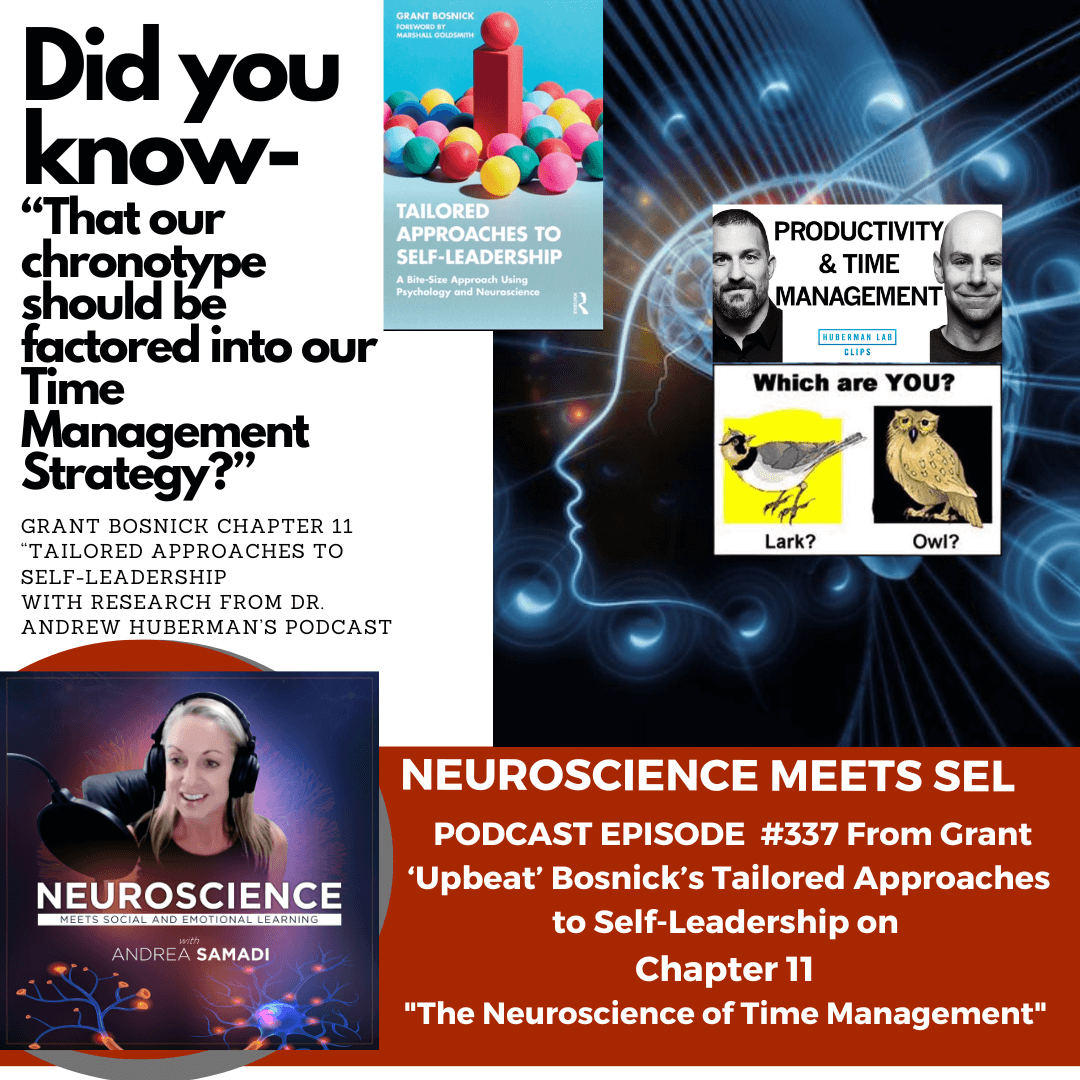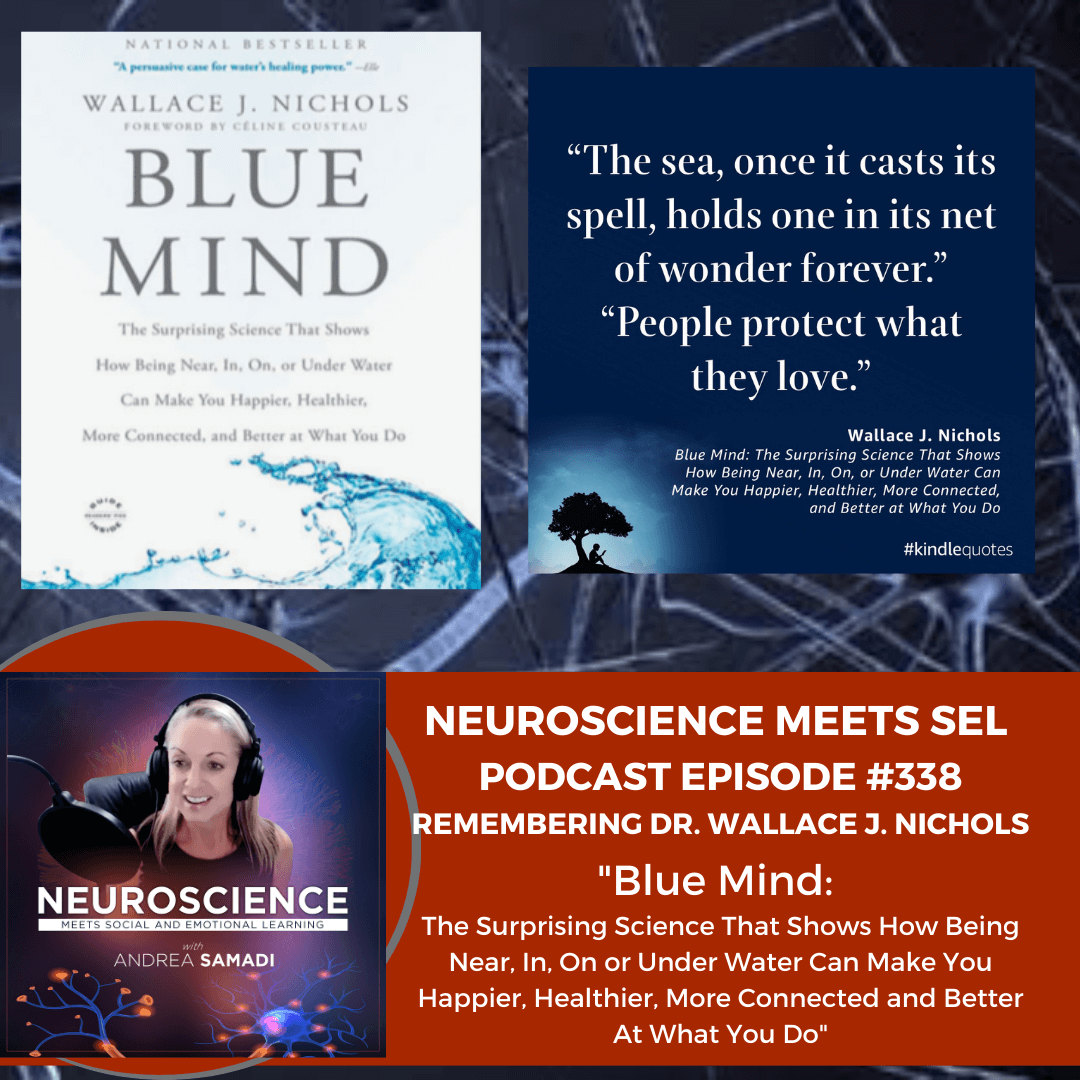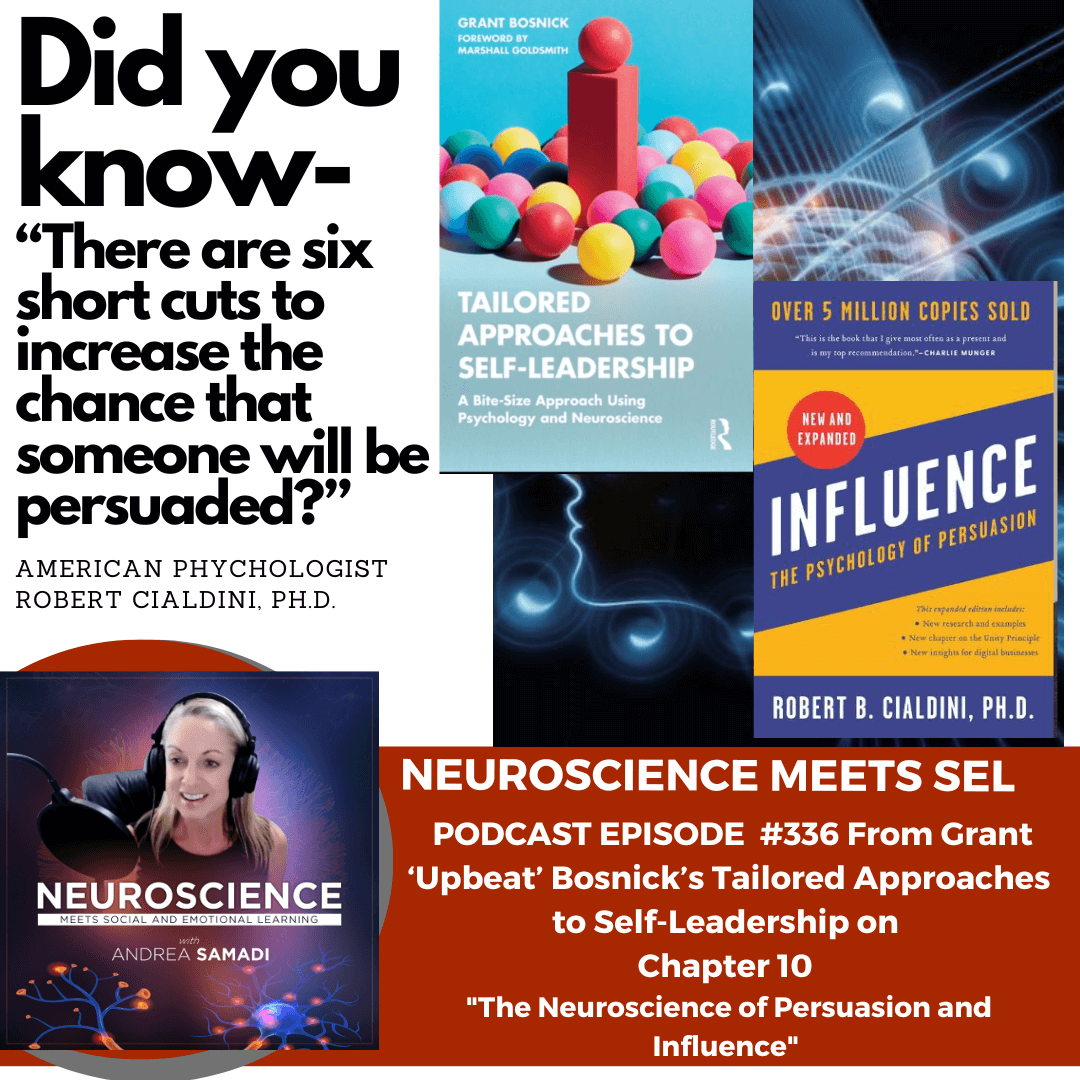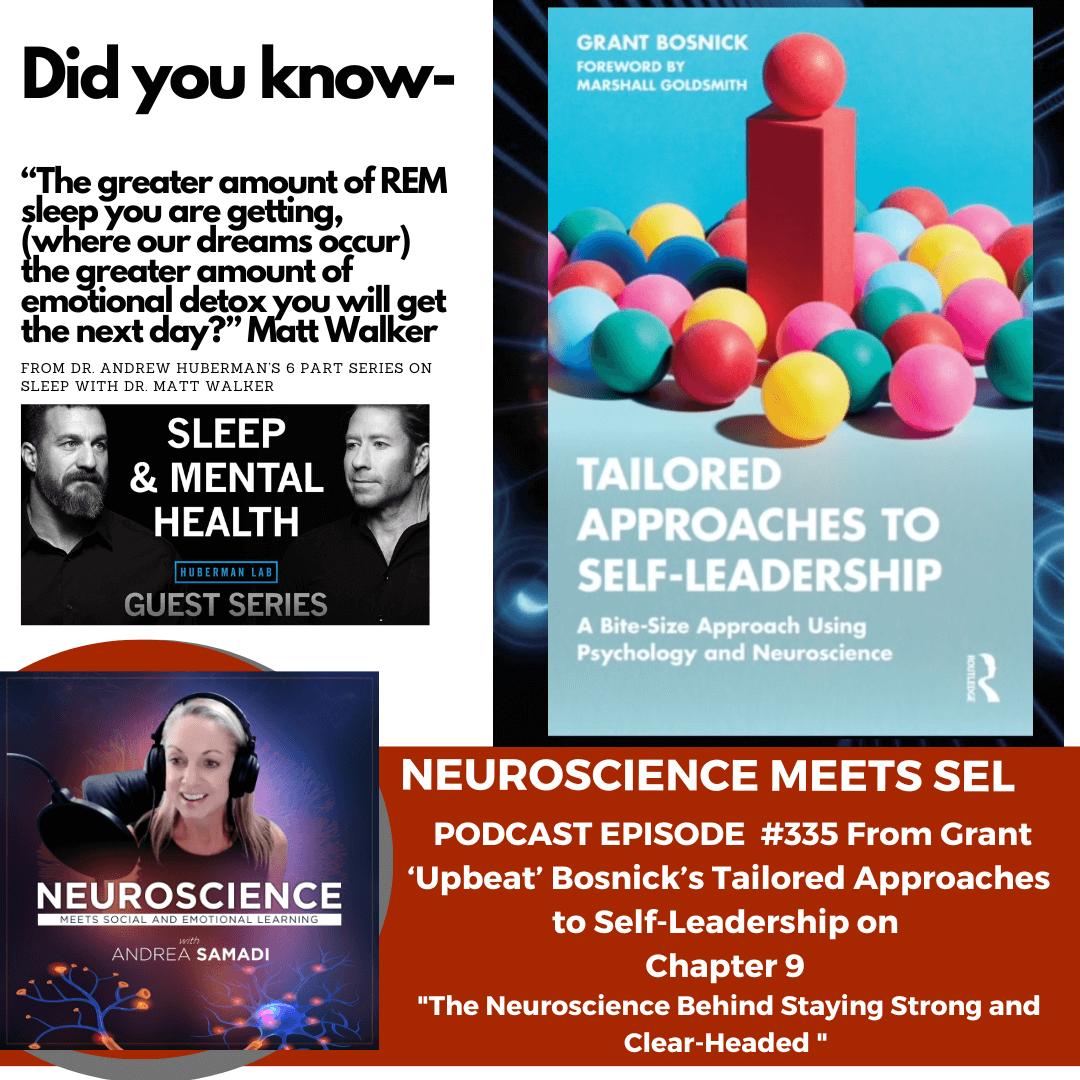Insights from Grant 'Upbeat' Bosnick and the Eureka Factor "AHA Moments, Creative Insight and The Brain" Chapter 7
Description
Welcome to Episode 330 of the Neuroscience Meets Social and Emotional Learning Podcast, a part of our 18-week series on self-leadership. Join host Andrea Samadi and author Grant Bosnick as they explore the neuroscience theory behind creating solid health habits, establishing goals, and increasing productivity for greater achievement and well-being.
Tap into the power of the AHA moment, and learn how to foster these spontaneous occurrences for instant performance improvement. Bosnick shares insights from his book "Tailored Approaches to Self-Leadership" and offers strategies for organizations to solve problems creatively using innovative thought processes.
Uncover the crucial role physical and mental health play, particularly the significance of adequate hydration for brain health and daily water intake recommendations. Learn about the concept of neuroplasticity and see examples of creative problem solving applied in real-life situations.
Listen as we bring to light interesting perspectives from Professor Hod Lipson from Columbia University on AI and innovation, discuss the Silva Method, and recall our first series on creativity and innovation. Take inspiration from figures like Albert Einstein and learn about hypnosis from the work of Dr. David Spiegel. Cultivate self-awareness and personally tailored plans using our practical five-step method to foster more 'aha' moments. Experience the magic of wisdom acquisitions drawn from a poignant poem by Stuart Edward White.
Ready to supercharge your personal and professional growth? Listen to our exciting and educational podcast that delves deep into the interaction of neuroscience and social and emotional learning. Don't forget to subscribe for more insightful episodes.
On today's episode #330 we continue with our 18-Week Self-Leadership Series based on Grant Bosnick’s “Tailored Approaches to Self-Leadership: A Bite Size Approach Using Psychology and Neuroscience” that we first dove into with our interview on EP #321[i] a few weeks ago. Now that we have started this series, I hope you can see how practicing and strengthening the skills we are learning each week, is cumulative. Each week, we are learning something new, that builds off the prior week, to help take us to greater heights in 2024. We can even map out our “Journey of the Mind” as we go along the way.
REVIEW Chapters 2, 3, 4, 5 and 6
It’s here I’m hoping we will take the information we are learning, connect the dots to form knowledge and then apply this knowledge to our daily life. This is where we go from theory to practice with this podcast and it’s the application of what we are learning that contains the magic.
REFLECT Back to Chapter 2 on The Neuroscience of Goals (and Kurt Lewin’s Force Field Theory): What are you doing today to gain the momentum needed to reach NEW and HEIGHTENED levels of performance this year? How are you improving your mental and physical health to gain the momentum we talked about in this chapter?
REFLECT Back to Chapter 3 on The Neuroscience of Inspiration: How are you using people or places that inspire you, to take your results to greater heights? Think about this as it relates to your physical and mental health. What else can you do to take more action in this area?
REFLECT Back to Chapter 4 on The Neuroscience of Mindfulness: Where are you in your Mindfulness Journey? Mindfulness, and breathing was listed often in Chapter 4. How is mindfulness helping you with your physical health?
REFLECT Back to Chapter 5 on The Neuroscience Behind Peak Performance: How are you practicing “getting into flow?” When do you notice it the most? Is it during physical exercise, or meditation? Are you practicing this state to gain 5x more productivity in this state?
REFLECT BACK to Chapter 6 on The Science Behind our Physical Health:
Where we narrowed our focus from a wide and complex field, to something we can implement immediately with “The Hydrated Brain for Improving Our Cognitive Performance.” Are you keeping your brain hydrated? Do you know how much water you are drinking every day? Grant reminds us that “everyone is unique and needs different amounts of water per day (but suggests) an adequate intake for men is roughly around 3 liters (100 fluid ounces) a day, (and) for women it’s about 2.2 liters (74 fluid ounces) a day. This is one area I know I can do better with, especially living in the desert, I know I can improve this one with some focused effort.
We will cover the remaining 6 chapters (Agility, Resilience, Relationships and Authenticity, Biases, Trust and Presence) after we take a break for me to navigate a new work schedule in my personal life. As soon as I have my footing here, and Dr. Shane Creado from EP 72[ii] reminded me the other day of our brain’s neuroplasticity, so I should be able to find the balance in a few weeks, and once I’m in the groove, and I’ll be back to finish this series. In the meantime, this will be a perfect time to put some serious thought into where we began this year, and where we are going. Think about the areas where we know we can improve, and get to work on these areas.
I’ll be using this time to strengthen my own mindset and be sure I’m applying each of these episodes that guarantees the strongest version of myself this year.
REMINDER: In this 18-week Series that we began in the beginning of February, we are covering:
✔ Powerful tactics from this Grant Bosnick’s award-winning book that illustrates how change and achievement are truly achievable both from internal ('inside out') and external ('outside in') perspectives.
✔Listeners will grasp the immense power of self-leadership and its transformative effect on personal growth and success by applying the neuroscience Grant has uncovered in each chapter.
✔Explore practical strategies for habit formation and the impact of a self-assessment system.
✔Gain insights from Grant's expert advice on maintaining a balance between strengths and weaknesses while chasing after your goals.
✔Embark on an intellectual journey that has the power to elevate personal achievement and self-awareness to uncharted levels while we map out our journey over this 18-week course.
There is great power and self-awareness that comes along with mapping out a plan designed specifically for YOU and I do encourage everyone to take Grant Bosnick’s Leadership Self-Assessment[iii] so you can see the areas for you that score a high, medium of low level of importance for you to focus on this year.
For Today, EPISODE #330, we cover Chapter 7, “AHA Moments, Creative Insight and the Brain” we will look at what Grant Bosnick covers on this topic, as well as a deeper dive into John Kounios and Mark Beeman’s fascinating book The Eureka Factor[iv] so we can all have a clear understanding of how these AHA Moments occur in the brain, and how exactly we can foster our own creative insights for unique and immediate improved performance.
✔ Tap into the power of the AHA moment, and learn how to foster these spontaneous occurrences for instant performance improvement.
✔ 5 Simple Steps for Illuminating our Personal and Professional Life with AHA Moments of Creativity.
✔ What Does Neuroscience Say About These AHA Moments of Creativity?
Today we dive into Chapter 7 of Grant Bosnick’s book as we cover “The Science Behind Insight” which came out as MEDIUM importance (orange score) for me, alongside mindfulness and flow. If you have taken the self-assessment, you’ll know it’s how you answer the questions, based on what’s of high priority for you, that determines the lessons that are important to begin now, or ones that you might think you have a handle on, so they show up as lower priority, or medium, like this topic did for for me. I do block out time every day for mindfulness, and am working on getting into “flow” with my work, but insight is a new skill for me. I’ve never sat down to see “what insight” will come into my mind today, as these types of moments happen spontaneously, like Alexis Samuels mentioned on EP 328[v] when he made the connection with financial literacy and gamification, in the shower.
What I loved about Grant Bosnick’s book Tailored Approaches to Self-Leadership is that he opens up chapter 7 with a story of how insight was used by an organization to help solve the problem with the high number of babies that die within a month of their birth, specifically in developing countries. This organization solved this specific problem using a thought process that took insight using “materials and human resources that could be used to address this issue” (Chapter 7, Bosnick) by building incubators made out of Toyota cars that were readily available in these developing areas.
Instead of using their analytical mind and thinking “how do we get more incubators to these areas” someone on their team used insight and creativity to come up with the best solution.
So how do we think up these creative ideas? Grant asks us to ponder where we have our best ideas.
- In the shower (like Alexis Samuels)?
While exercising?
At your desk while doing work?
Just before falling asleep or waking up?
While walking or hiking?
While taking with a friend?
Grant suggests that few people will come back with “at their desk while working” since this type of creativity involves breaking away from the analytical, thinking mind, and tapping into our “nonconscious” (Chapter 7, Bosnick) part of our brain.
It was here I had to look deeper into how this type of thinking happens, and I found the fascinating book, The Eureka Factor: AHA Moments, Creative Insight and the Brain by John Kounios and Ma

